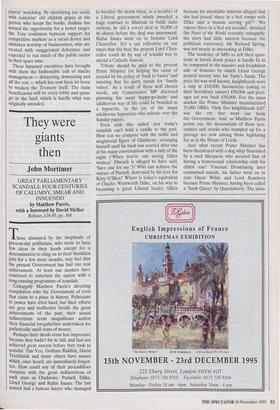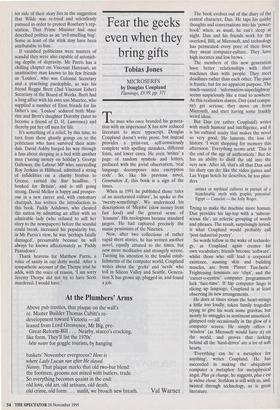They were giants then
John Mortimer
GREAT PARLIAMENTARY SCANDALS: FOUR CENTURIES OF CALUMNY, SMEAR AND INNUENDO by Matthew Parris, with a foreword by David Mellor Robson, £16.95, pp. 368 Those dismayed by the ineptitude of present-day politicians, who seem to have few ideas in their heads except for a determination to cling on to their thankless jobs for a few more months, may feel that the present Government has had one real achievement. At least our masters have contrived to entertain the nation with a long-running programme of scandals.
Unhappily Matthew Parris's diverting compilation robs the Government of even that claim to a place in history. Politicians in power have tried hard, but their efforts are grey and ineffective beside the great achievements of the past; their sexual indiscretions seem insignificant and/or their financial irregularities undertaken for pathetically small sums of money.
Perhaps their deeds seem less impressive because they hadn't far to fall, and had not achieved great success before they took to scandal. Tim Yeo, Graham Riddick, David Treddinick and many others have names which, once heard, are immediately forgot- ten. How could any of their peccadilloes compare with the great indiscretions of such stars as Gladstone, Parnell, Dilke, Lloyd George and Rufus Isaacs. The last named had a famous lawyer who managed to weather the storm when, as a member of a Liberal government which awarded a huge contract to Marconi to build radio stations, he did a covert deal in 10,000 of its shares before the deal was announced. Rufus Isaacs went on to become Lord Chancellor. It's a sad reflection on our times that the best the present Lord Chan- cellor could do by way of scandal was to attend a Catholic funeral.
Tribute should be paid to the present Prime Minister for helping the cause of scandal by his policy of 'back to basics' and insisting that his party stands for 'family values'. As a result of these well chosen words, any Conservative MP disclosed pursuing his usual happy-go-lucky and adulterous way of life could be branded as a hypocrite, to the joy of the many adulterous hypocrites who salivate over the Sunday papers. Even with this added zest today's scandals can't hold a candle to the past. How can we compete with the noble and magisterial figure of Gladstone, scourging himself until his back was scarred after one of his many conversations with a lady of the night ('When you're out saving fallen women,' Disraeli is alleged to have said, `Save one for me.')? Who can achieve the stature of Parnell, destroyed by his love for Kitty O'Shea? Where is today's equivalent of Charles Wentworth Dilke, on his way to becoming a great Liberal leader, fallen because his unreliable mistress alleged that she had joined 'three in a bed romps with Dilke and a buxom serving girl'? 'We expose three in a bed sex scandal', shrieked the News of the World recently; unhappily, the story had little interest because the politician concerned, Mr Richard Spring, was not nearly as interesting as Dilke.
The tendency of MPs to sell their ques- tions at knock down prices is hardly fit to be compared to the massive and fraudulent sale of honours by which Lloyd George poured money into his Party's funds. The price list was well known, knighthoods were a snip at £10,000, baronetcies (owing to their hereditary nature) £30,000 and peer- ages set you back £50,000. For the mass market the Prime Minister manufactured 25,000 OBEs. 'Only five knighthoods left!' was the cry that went out from the Government. And, as Matthew Parris points out, the descendants of those non- entities and crooks who stumped up for a peerage are now among those legislating for us in the House of Lords.
And what recent Prime Minister has been threatened with a dog whip flourished by a mad Marquess who accused him of having a homosexual relationship with his eldest son? Viscount Drumlanrig later committed suicide, his father went on to ruin Oscar Wilde and Lord Rosebery became Prime Minister, having been called a 'Snob Queer' by Queensberry. The sinis- ter side of their story lies in the suggestion that Wilde was re-tried and relentlessly pursued in order to protect Rosebery's rep- utation. That Prime Minister had once described politics as an 'evil-smelling bog'. Some at least of the stink may have been attributable to him.
If vanished politicians were masters of scandal they were also capable of astonish- ing depths of depravity. Mr Parris has a chilling chapter on Viscount Harcourt, an unattractive man known to his few friends as Toulon', who was Colonial Secretary and a practising paedophile, as was his friend Reggie Brett (2nd Viscount Esher) Secretary of the Board of Works. Brett had a long affair with his own son Maurice, who supplied a number of Eton friends for his father's use. Toulon' seduced both Mau- rice and Brett's daughter Dorothy (later to become a friend of D. H. Lawrence) and thereby put her off men for life.
It's something of a relief, by this time, to turn from these ghastly goings on to the politicians who have survived their scan- dals. David Ashby barged his way through a fuss about sleeping in a bed with another man (`saving money on holiday'). George Galloway, the Labour MP who, succeeding Roy Jenkins at Hillhead, admitted a string of infidelities on a charity freebee to Greece, earned the Star headline, 'I bonked for Britain', and is still going strong. David Mellor is happy and prosper- ous in a new career and, with customary chutzpah, has written the introduction to this book. Paddy Ashdown, who cheated the nation by admitting an affair with an admirable lady (who refused to sell her story to the newspapers) before the scandal could break, increased his popularity but, in Mr Parris's view, he was 'perhaps fatally damaged', presumably because he will always be known affectionately as 'Paddy Pantsdown'.
Thank heavens for Matthew Parris, a voice of sanity in our dotty world. After a sympathetic account of the Thorpe trial he adds, with the voice of reason, 'I am sorry Jeremy Thorpe did not try to have Scott murdered. I would have.'



















































































 Previous page
Previous page